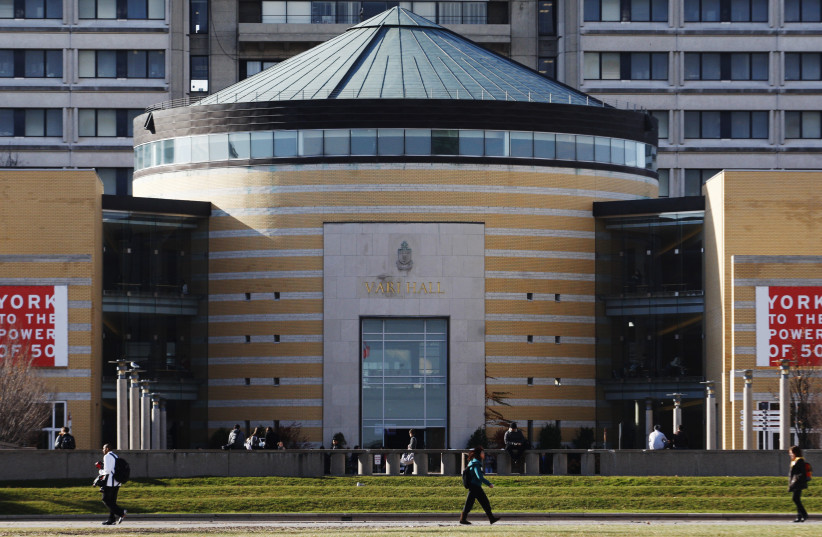Since October 7, there has been a proliferation of students vocalizing their views on the Hamas-Israel war. Most universities are no strangers to differing views; however, the already prominent friction between students has increased since the Palestinian Solidarity Working Group released its Toolkit on Teaching Palestine at York University. As a Canadian student based in Ontario, I am deeply concerned about the damage this “toolkit” could cause to the Jewish community both on and off campus.
While the intention of this toolkit may have been to educate students on the struggles the Palestinian community faces on campus and beyond, it has ultimately also become harmful to the Jewish community. The toolkit refers to Hillel York as a “Zionist cultural institution,” which is a misrepresentation of Hillel and is meant to be libelous. According to the director of Hillel York, Dean Lavi, “Hillel is a safe haven for Jewish students on campus. Misrepresenting Hillel as a “Zionist cultural institution” may result in jeopardizing the safety of the students going there for sanctuary.
This has already proven to be true, given the extensive online targeting of students and the aggressive nature of recent protests. Given the lack of critical thinking that has been apparent within some educational institutions, groups of students have been influenced to join protests without clear knowledge or understanding of the context or impact behind them.
The rising hate towards the Jewish community has been astronomical. According to Toronto Police, as reported by many news outlets in 2023, there was a 103% increase of reported antisemitic incidents, compared to 2022.
This toolkit further exacerbates the dichotomous perspective of oppressor and oppressed, which can result in further Jew hatred and divisiveness within the community at large. On page 5, the toolkit discusses how the Palestinians are “victims of genocide” and how “for the first time they are broadcasting the genocide of their people, the destruction of their culture and histories.”

They also discuss Israel depriving them of basic human needs, such as food, shelter, and access to healthcare. This creates the idea that Israelis are aiming to not only cause genocide, which by definition is a major decrease in population – which is not happening – but also that the aim is to erase culture and identity. Israel has gone to lengths to avoid as many civilian casualties as possible while trying to dismantle Hamas and bring the hostages home.
When the goal and intent is genocide, civilians are killed without a second thought and attacks are initiated. Israel has not initiated any attacks on any of the neighboring Arab states and did not initiate attacks toward Palestinians.
Israel has taken to the defensive side rather than the offensive; only defending after Hamas initiated attacks. When only reporting on Israel, it seemingly acts to vilify it rather than educate on problems faced.
There is nothing written about the attacks towards Israel, only the ones done by Israel “following a long and brutal 75-year-settler-colonial occupation of Palestine” referring to Israelis as “settlers” rather than the people who came back to their ancestral land. Settlers by definition are those who immigrate to a new place with the intention of staying there, and if people are native/indigenous to that land, they cannot be settlers there or colonize it. Colonization only applies to those not indigenous to the land and who seek to control it.
This toolkit also quotes an American author and civil rights activist by the name of James Baldwin; part of the quote is “If I love you, I have to make you conscious of the thing you don’t see,” however, this toolkit expresses a one-sided viewpoint. Creating an environment where there is no space for nuance forces students to choose “a side” based on the little knowledge given.
Unable to indicate which river or which sea
Frequently, when Pro-Palestinian protesters are questioned about what the chant “From the river to the sea Palestine will be free” means, many are unable to properly indicate which river and which sea. This supports the concern of people blindly following the crowd without being properly educated about the cultures and communities involved, and what each actually stands for. My concern is that this toolkit will further propagate the mob mentality that has already been infiltrating campus life.
According to the National Library of Medicine, “Throughout history, Jewish communities have been exposed to collectively experienced traumatic events.” Although we as a community have faith that we will shine brighter and come back stronger than before, there are many within our community who feel compelled to hide their Judaism as a precaution. Jewish people have proven time and time again how resilient we are, and will continue to be. Our voices will never be stifled. Although many people are saying, “Never again is now,” that is not quite accurate as it implies that we are powerless and victimized; we are neither.
The writer is involved with Allied Voices for Israel and is a student executive with Hillel, studying at Toronto Metropolitan University in the Faculty of Community Services.
